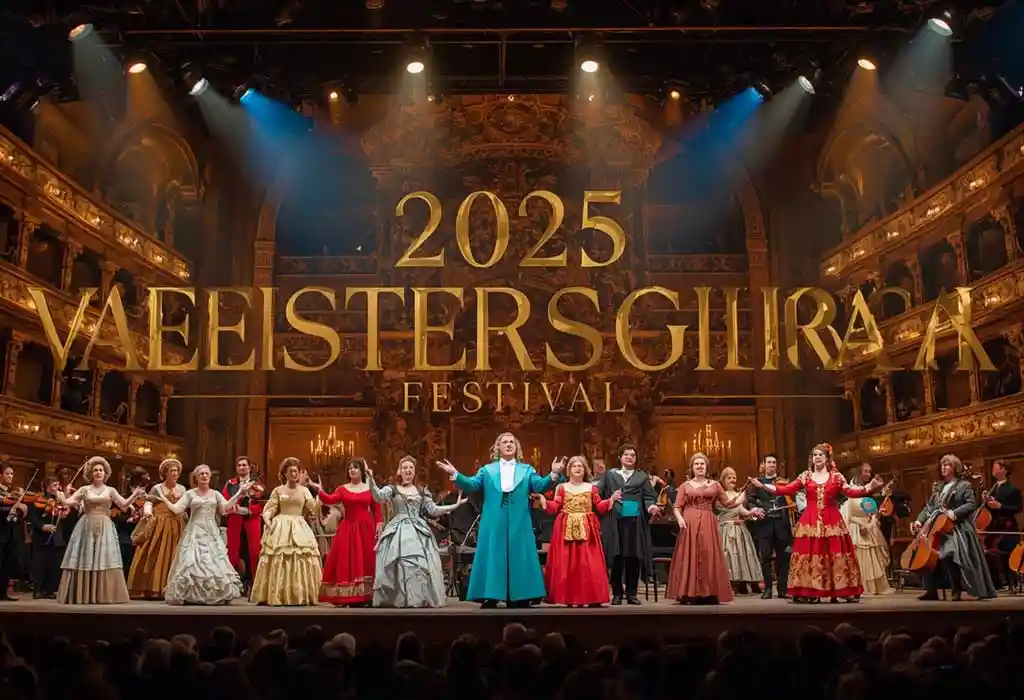In Wagner’s home town of Bayreuth, the 2025 ‘Meistersinger’ is about to turn heads

Bayreuth
Bayreuth: Deconstructing the Canon: How a “Wild Remix” Liberates Wagner from Tradition
The Bayreuth Festival, held in the theater Wagner himself designed, is the most sacred temple of his musical legacy, a place where tradition often weighs heavily on every production. Matthias Davids’ “wild remix” of Die Meistersinger von Nürnberg is therefore a radical and significant act of cultural liberation. For decades, Wagner’s works, and this opera in particular, have been burdened by historical baggage; its celebration of “holy German art” was infamously co-opted by the Nazi regime, casting a long and troubling shadow over its otherwise comedic and humanist themes. Davids’ approach—with its inflatable cows, popcorn scent, and Elvis-inspired electric guitars—is not mere irreverence for its own sake. It is a deliberate strategy to break this oppressive historical chain, using absurdity and kitsch to disarm the opera’s toxic potential and make it accessible for a modern audience. By transforming the setting from a venerated, romanticized 16th-century Nuremberg into a chaotic, Hollywood-inspired funhouse, he shifts the focus from nationalistic pomp to universal human comedy. The most powerful moment of deconstruction is the new ending: Eva’s refusal of the guild’s medal. This single gesture subverts the original’s conservative conclusion, where societal acceptance is the ultimate prize. Instead, Davids proposes that true happiness lies outside rigid, traditional structures, in individual freedom and love. This production argues that to keep classic art alive, it must sometimes be shattered and reassembled, allowing its timeless elements—like the beauty of the music and the core love story—to shine through without the distortion of a problematic past.
Bayreuth: The Aesthetics of Absurdity: Inflatable Cows and Popcorn as Critical Commentary
The visual language of this production is its most immediate and shocking feature, and every bizarre choice serves as a piece of sharp critical commentary. The central image of the upside-down inflatable cow is a multi-layered symbol. As director Davids bluntly states, it frames Eva as a “prize cow… on sale,” directly critiquing the opera’s (and by extension, historical society’s) treatment of women as commodities to be won in a contest between men. Its bouncy-castle nature, complete with flame-proof fabric, injects a jarring, childish absurdity into the solemn world of the Meistersinger, mocking the guild’s self-important rituals. When Beckmesser cuts the power and the cow deflates, it becomes a powerful metaphor for the collapse of these hollow traditions, leaving the characters literally in the dark until the machinery of the old guard (Sachs rushing to the hidden blower) artificially re-inflates it. The pervasive “kitschy Hollywood vibe” and the smell of popcorn further frame the entire song contest as a piece of entertainment, a spectacle. This reduces the guild’s earnest rules and judgments to the level of a talent show, questioning the very nature of how art is judged and valued. Are the Meistersingers arbiters of true art, or are they just putting on a show for public consumption? The costumes deepen this satire, mashing up eras and styles—dirndls with T-shirts, Trachten jackets with mirrored sunglasses—to create a timeless, slightly off-kilter world where the rules of any single era don’t apply, freeing the story from its specific historical context and allowing its satirical edge to cut more broadly.
Bayreuth: The Human Core Amidst the Chaos: How Chemistry and Music Ground the Spectacle
Despite the whirlwind of absurdist staging, the production’s ultimate success hinges on its ability to preserve and even enhance the human emotional core of Wagner’s work. The deliberate contrast between the chaotic, satirical world of the guild and the genuine, “youthful spark” between Eva and Walther is its masterstroke. While the society around them is preoccupied with inflatable livestock and power struggles, Christiane Nilsson and Michael Spyres portray a love that is tender, authentic, and playful. Nilsson’s description of enjoying Spyres’s “tender tenor” indicates a performance built on mutual musical support and genuine connection, which makes their defiant exit at the end feel earned and emotionally satisfying. This focus on authentic relationship is what prevents the production from becoming a cold, intellectual exercise. Furthermore, the return of conductor Daniele Gatti ensured that the musical execution was of the highest Bayreuth standard. The fact that the famously critical Bayreuth audience chose to applaud rather than boo is a testament to this balance; the musical integrity remained untouched, allowing the staging to challenge and provoke without undermining the score’s power. The audience’s grins, noted by Nilsson, are the ultimate evidence of success. They signify not just amusement at the comedy, but a joyful appreciation for a production that managed to be both intellectually stimulating, visually astonishing, and emotionally resonant, proving that a classic can be both respected and radically reimagined.

Reference Website:
https://abcnews.go.com/Entertainment/wireStory/bayreuths-2025-production-wagners-meistersinger-features-technicolor-twist-124690344





